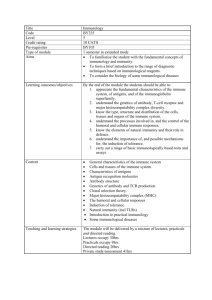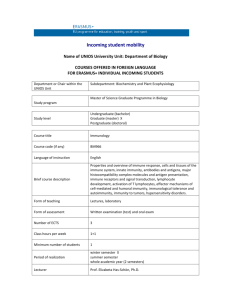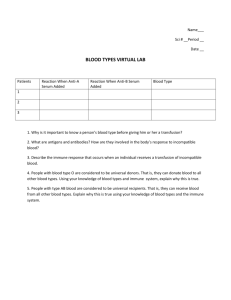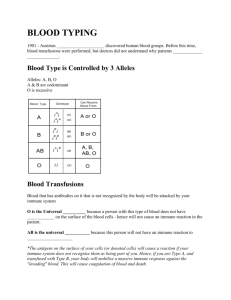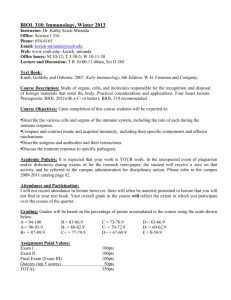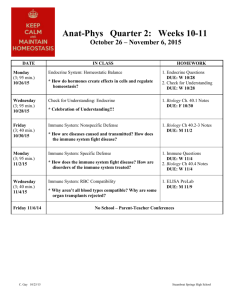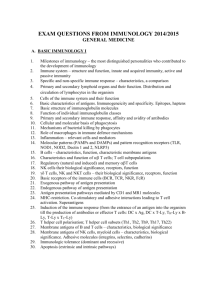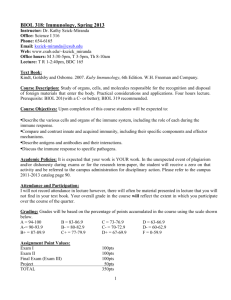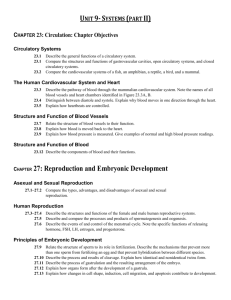Select this.
advertisement
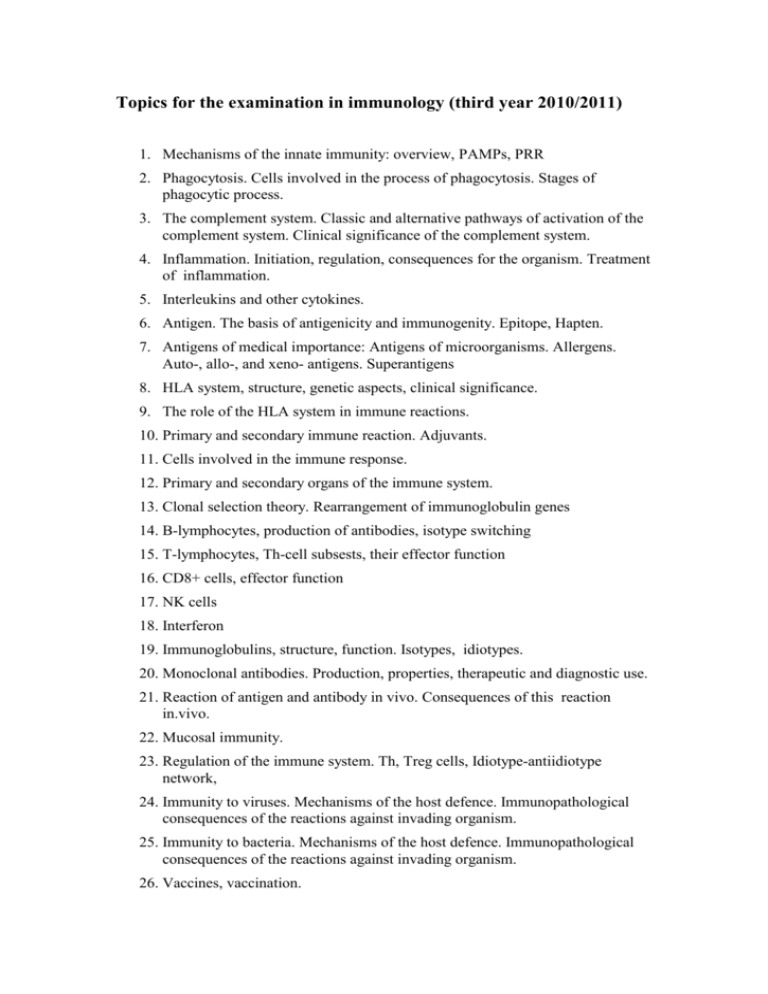
Topics for the examination in immunology (third year 2010/2011) 1. Mechanisms of the innate immunity: overview, PAMPs, PRR 2. Phagocytosis. Cells involved in the process of phagocytosis. Stages of phagocytic process. 3. The complement system. Classic and alternative pathways of activation of the complement system. Clinical significance of the complement system. 4. Inflammation. Initiation, regulation, consequences for the organism. Treatment of inflammation. 5. Interleukins and other cytokines. 6. Antigen. The basis of antigenicity and immunogenity. Epitope, Hapten. 7. Antigens of medical importance: Antigens of microorganisms. Allergens. Auto-, allo-, and xeno- antigens. Superantigens 8. HLA system, structure, genetic aspects, clinical significance. 9. The role of the HLA system in immune reactions. 10. Primary and secondary immune reaction. Adjuvants. 11. Cells involved in the immune response. 12. Primary and secondary organs of the immune system. 13. Clonal selection theory. Rearrangement of immunoglobulin genes 14. B-lymphocytes, production of antibodies, isotype switching 15. T-lymphocytes, Th-cell subsests, their effector function 16. CD8+ cells, effector function 17. NK cells 18. Interferon 19. Immunoglobulins, structure, function. Isotypes, idiotypes. 20. Monoclonal antibodies. Production, properties, therapeutic and diagnostic use. 21. Reaction of antigen and antibody in vivo. Consequences of this reaction in.vivo. 22. Mucosal immunity. 23. Regulation of the immune system. Th, Treg cells, Idiotype-antiidiotype network, 24. Immunity to viruses. Mechanisms of the host defence. Immunopathological consequences of the reactions against invading organism. 25. Immunity to bacteria. Mechanisms of the host defence. Immunopathological consequences of the reactions against invading organism. 26. Vaccines, vaccination. 27. Primary defects of antibody production, T-cell deficiencies, SCID. Clinical manifestation, diagnosis, treatment. 28. Deficiencies of the complement and phagocytic system. Hereditary angioedema. Wiskott-Aldrich syndrome, ataxia telangiectasia. Clinical manifestation, diagnosis, treatment. 29. Non-AIDS secondary immune deficiencies. 30. HIV-disease, pathogenesis. 31. HIV disease – clinical manifestation, diagnosis 32. Passive immunisation. Immunoglobulin derivates. 33. Anaphylactic shock. Immunopathological mechanisms, diagnosis, principles of treatment. 34. Atopy. The role of IgE. Mediators of the allergic reaction. Early and late phase of type-I immunopathological reaction. 35. Diagnosis and therapy of atopic diseases. 36. Delayed-type of hypersensitivity. Tuberculin test. In vivo testing of Tlymphocyte function. 37. Immune complex-mediated immunopathological diseases. 38. Autoimmune reactions: mechanisms of triggering the autoimmune reaction. Genetic and environmental influences. 39. Immune tolerance. 40. Laboratory tests for the detection of autoantibodies. Antinuclear and other clinically important autoantibodies. 41. Transplantation immunology. Organ transplantation. Bone marrow transplantation. 42. Immunological aspects of blood transfusion. Polysaccharide and protein blood group antigens. Adverse reactions to transfusion. 43. Immune interactions between mother and fetus. Immunology of reproduction. 44. Immune system and tumors. Protective mechanism against tumors. Immunological diagnosis and treatment in oncology. 45. Immunity in childhood and in elderly. 46. Manipulation with the immune system - immunopotentiation, immunosuppressive agents. 47. Serum. Classic serological reactions: Agglutination, precipitation. 48. Immunoassays: ELISA, RIA, Immunofluorescence. 49. Lymphocyte subsets determination 50. Paraproteins, detection, clinical significance
